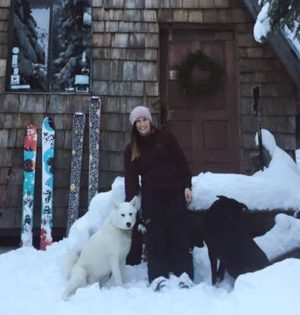
Ski patroller / paramedic Megan Frawley and pals.
Ski patroller Megan Frawley knows about ski hill injuries — both to workers and the public.
“Because skiing is obviously seasonal, too often we jump back into it thinking we were in the same shape as the end of the previous season, and we can get hurt. I am quite active year round, but I try to do some extra strength training before the beginning of the season so that I’m able to safely perform my job,” Megan says.
“I like to work my way back up to that level, and I also try to avoid pushing myself too hard. Maybe this comes from seeing so many injuries and having a good understanding of the system, but I do not want to be hauled off the hill by my coworkers because I pushed myself too far.”
Megan started in the industry as a ski patroller on the hills of North Vancouver, then later earned her Emergency Medical Responder certificate from the Justice Institute of BC, followed by her Primary Care Paramedic license. This season, she’ll be working as a volunteer patroller.
Megan says most of their first aid calls are for the public, not workers. That said, it’s still important for workers to be prepared.
“I’d recommend to those who are interested in patrol to stay on top of their fitness and realize the physical demand of the job,” she said, adding that most injuries on the hill are knee and ankle-related.
“I would say that a majority of those who incur these injuries are tourists or those who spend less than 20 days on a ski hill. I believe that most of these people are not only lacking the fitness, but possibly the skills needed to prevent themselves from getting hurt. Most injuries also occur in the afternoon, so I can assume that these injuries might be a result of fatigue related to lack of physical stamina.”
Fit For Snow program
Injuries to snow sport workers are a focus of Dr. Delia Roberts of Selkirk College. She created a program called Fit For Snow to help combat injuries to patrollers, instructors, and lift operators. It’s based on her research at five ski resorts in Western Canada during the 2010/2011 winter season with more than 75 patrollers, instructors and lift operators to evaluate their typical daily workloads/stresses and dietary/hydration patterns.
At resorts using Fit For Snow program, there was a 67% reduction in the number and severity of injuries reported in worker compensation claims. The program focuses on exercise, nutrition, hydration, proper rest/recovery, and more. Dr. Roberts has also created Fit to Drive for trucking professionals and Fit to Plant for treeplanters.


